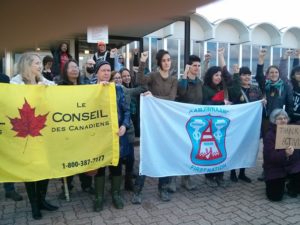Gray charges dropped in court

By Colin Graf
AAMJIWNAANG FIRST NATION—Charges carrying a potential life sentence were dropped against an Aamjiwnaang environmental activist, Vanessa Gray, 24, in Sarnia court on January 13. She has been facing criminal mischief charges since she and two other women caused a shutdown of the Enbridge Line 9 pipeline from Sarnia to the Montreal area in Dec. 2015. They entered a locked, fenced compound and shut off a valve on the pipeline near Aamjiwnaang.
“We are incredibly pleased,” said Gray’s lawyer, Nick Cake, following the resolution of the case Friday. “The Crown felt they had no realistic prospect of conviction” on a charge of mischief endangering life against Gray and companions, Sarah Scanlon and Stone Stewart, both of Guelph, he said. The women have accepted a peace bond stating they will stay off Enbridge property for 18 months and keep the peace, Cake explained.
The Crown simply couldn’t prove the women had endangered life by manipulating the valve, he said. Through research into Ontario and Quebec case law, it appears this is the first time activists have been charged with endangering life, and so is precedent-setting, said Cake.
The women were protesting the use of Line 9 to bring bitumen from the Alberta tar sands for processing in eastern Canada. During the incident, an “anonymous call” to Enbridge in Alberta alerted the company to shut down the line, the Crown claimed during an earlier court appearance. Supporters of the activists said on social media the protestors made the call themselves from the rural site, before turning off the valve. Photos of the trio at the Enbridge site have circulated on social media.
Shutting the valve “could have resulted in a leak or rupture anywhere along the line” running from Sarnia to Montreal, the Crown claimed previously in court. Line 9, which previously brought foreign oil from Montreal for processing in the Sarnia area, began shipping the Alberta crude earlier in Dec., after a lengthy approval process.
Dropping the charges was the result of many discussions with the Crown Attorney’s office, and was “a hard fought battle”, said Cake, who added he was pleased with the “reasonableness” of the Crown in Sarnia, home to numerous petrochemical plants and oil refineries in what is known as Canada’s “Chemical Valley.”
“When you’re the Crown in Sarnia and big oil is being “victimized,” you will feel some pressure,” he said. “My air quotes [around the word “victimized”] couldn’t be any bigger,” he followed with.
Other charges of mischief over $5,000 against the trio were also dropped, as the Crown determined “it was not in the public interest to proceed”, Cake said.
Gray said Friday she would continue her work against petrochemical companies as it is her inherent right as Anishinaabe to defend the water and health of all people. She has become well-known in the Sarnia area over the last few years as an activist involved in various protests and research projects dealing with pollution issues in the Aamjiwnaang and Sarnia area, including the annual “Toxic Tour” of the Chemical Valley.
Enbridge is disappointed with the outcome of the case, a spokesperson said in a prepared email statement. “Tampering with energy infrastructure is very serious and potentially dangerous. At Enbridge, the safety of the public, the environment, and our workers are always our top priority and tampering with energy infrastructure has the potential to cause real harm to the public, to the environment, and to the activists themselves,” the statement said.
Dropping the charges was “a good thing,” said Aamjiwnaang Chief Joanne Rogers, reached at her home. “We have to support our members no matter what,” and the charges put a strain on relationships between the First Nation and the chemical companies whose operations surround the territory, she said.
Chief and Council are always trying to improve relations with industry, and have numerous pipeline agreements regarding lines that run under First Nation lands which sometimes need re-negotiating, she explained.
Ontario First Nations have not supported the reversal of Line 9. The Chippewas of the Thames (COTTFN), near London, have challenged the federal government over its consultations with First Nations about the project. They are currently waiting for a ruling from the Supreme Court of Canada on the duty to consult, after a hearing last Nov.
Aamjiwnaang has supported the COTTFN position. Neither Enbridge nor the National Energy Board consulted Aamjiwnaang properly during the approval process, according to a presentation made by former Chief Chris Plain to the Board in 2013.
Aamjiwnaang ancestors have lived in and harvested resources from traditional territory, including lands where Line 9 runs and Enbridge’s Sarnia terminal is located “since time immemorial,” Plain told the Board at that time. He asserted the First Nation has Indigenous and Treaty Rights throughout the traditional territory which are recognized, affirmed, and protected by the Constitution Act. Community members have Indigenous harvesting rights to hunt, fish, trap, gather plants, minerals and oil, for any purpose, including for food, social and ceremonial purposes, or sale, Plain claimed.
He also objected to the fact that the federal Crown and/or Enbridge are not sharing the revenues generated by shipping oil through traditional territory.
Operation of the pipeline will cause significant new socioeconomic, health, and environmental effects on reserve lands, Plain also said in 2013. The proximity of the Terminal to the reserve and waterways running through Aamjiwnaang, toxic air emissions caused by storing crude oil at the Terminal, and the risk of spills, leaks, and discharges of crude oil at the Terminal itself have the potential to seriously impact residents’ health, he said.
There is already evidence that pollution may be causing serious effects on the reserve, Plain asserted, including a scientific study that identified a pronounced statistically significant decrease in the number of males born there from 1994 – 2003, he stated.

